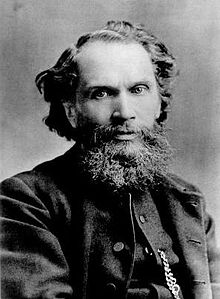Benjamin Waugh
| Benjamin Waugh | |
|---|---|

Reverend Benjamin Waugh in about 1900
|
|
| Born |
20 February 1839 Settle, North Yorkshire |
| Died | 11 March 1908 (aged 69) Westcliff, Essex |
| Nationality | English |
| Education | Theological college, Bradford |
| Occupation | Minister |
| Religion | Congregationalist |
The Reverend Benjamin Waugh (20 February 1839 – 11 March 1908) was a Victorian social reformer and campaigner who founded the UK charity, the National Society for the Prevention of Cruelty to Children (NSPCC) in the late 19th century, and also wrote various hymns.
Waugh was born, the son of a saddler, in Settle, North Yorkshire and attended theological college in Bradford before moving to Newbury, Berkshire and then in 1866 to London.
Working as a Congregationalist minister in the slums of Greenwich, Waugh became appalled at the deprivations and cruelties suffered by children. Critical of the workhouse system, the Poor law and aspects of the criminal justice system as it affected children, he wrote a book (The Gaol Cradle, Who Rocks It?, 1873) urging the creation of juvenile courts and children's prisons as a means of diverting children from a life of crime. He also served on the London School Board from 1870 to 1876.
He was also, from 1874 to 1896, editor of a religious periodical, The Sunday Magazine, in which he published several of his own hymns, among which is "Now let us see thy beauty, Lord", which has appeared in several editions of the Methodist Hymn Book, in Congregational Praise and in the Australian Hymnbook, though not in its successor, Sing Alleluia.
In 1884, he founded the London Society for the Prevention of Cruelty to Children (echoing a similar initiative in Liverpool), launched at London's Mansion House on 8 July. The London body's first chairman was veteran social reformer Earl Shaftesbury. It evolved to become the NSPCC some five years later (14 May 1889), with Waugh as its first director and Queen Victoria as its first patron.
...
Wikipedia
